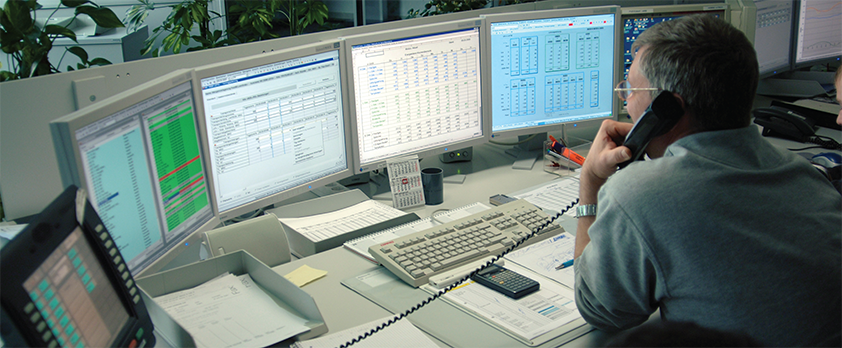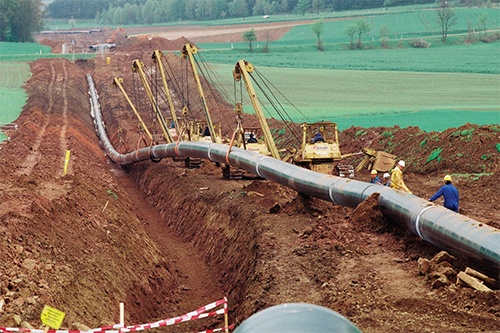
E.ON Gastransport
Building the future
With 75 years’ experience in the gas business, E.ON Gastransport operates one of the most efficient gas transmission systems in Europe.
Operating as a wholly owned subsidiary of E.ON Ruhrgas, E.ON Gastransport is Germany’s leading gas transmission company and is responsible for effectively maintaining the country’s largest and most complex natural gas pipeline system, which consists of a network covering some 11,600 kilometres.
To effectively do this, the business has developed an infrastructure that is tailormade to its customers’ requirements, and to the requirements of the German natural gas market. And while this has been achieved with much success, recent developments in the European natural gas industry mean that continuous development of Germany’s gas infrastructure is essential.
Stephan Kamphues, who is CEO at E.ON Gastransport and president of the newly formed association of European gas network operators, known as ENTSOG, explains more about the shift in direction in the gas market: “The gas transmission market is undergoing major change. But even in a regulated environment it continues to be our business to ensure reliable gas transmission. This is not altered by regulation, but is not made any easier either.
 “Transposition of the EU’s third internal market package into national law requires a great deal of time, effort and money. As we are not able to receive services from vertically integrated companies in the future we have to reorganise ourselves completely. A lot of infrastructure that is currently used as a shared service has to be replicated. For example, we have to set up our own accounting, HR services and IT infrastructure.”
“Transposition of the EU’s third internal market package into national law requires a great deal of time, effort and money. As we are not able to receive services from vertically integrated companies in the future we have to reorganise ourselves completely. A lot of infrastructure that is currently used as a shared service has to be replicated. For example, we have to set up our own accounting, HR services and IT infrastructure.”
As Stephan explains, significant changes in the gas transmission market are affecting the manner in which companies operate in the industry. One key factor is the merging of the various markets in Europe, which Stephan believes will bring considerable benefits to the European sector: “Network operators work primarily in their national regulatory environments, which vary greatly. For instance, French gas cannot be fed into the German network because different gas odourisation techniques are used in the two countries. “In my view, the new European energy regulator, known as ACER, must be the driving force for integration into a single market,” he continues. “Transmission network operators want to advance this trend towards harmonisation in Europe. To arrive at a European solution they must work together and, ideally, draft co-ordinated rules for capacity management.”
Having much experience in the field, E.ON Gastransport is ideally placed to meet any challenges that come from these mergers, and other changes in the market. The business is committed to laying the foundations both for its business and for Germany’s natural gas transmission infrastructure. “As Germany’s leading gas transmission company we meet the international challenges posed by regulation by positioning ourselves for the developments of co-operation between market areas and promoting the integration of European markets and networks,” says Stephan. “Together with the other market players we have to draw up simplified European rules for cross-border gas trading.”
As previously mentioned, as well as being CEO of E.ON Gastransport, Stephan is the president of the newly formed association of European gas network operators, known as ENTSOG. Established in December 2009 ENTSOG is responsible for promoting the completion and functioning of the internal market, cross-border trade for gas and ensuring the optimal management, co-ordinated operation and sound technical evolution of the European natural gas transmission network.
Of course, being in this position allows Stephan to gain a valuable insight into current and future gas trends, a fact that will certainly benefit E.ON Gastransport moving forwards. He explains: “Apart form transparent, cross-border access to pipeline systems we want to push ahead with technical enhancement of the network and create sufficient interconnections between countries. The tracks have been laid. We have already carried out our research, and prepared a ten-year network development plan offering an unprecedented comprehensive overview of investment projects in Europe. It shows the state of development of envisaged and advanced projects, such as Nord Stream and other infrastructure projects.”
As one of Europe’s leading gas transmission companies E.ON Gastransport is playing an important role in building this infrastructure by continuously developing and updating its pipeline network. In 2010 the company will be managing more than 20 nationwide construction and maintenance works to maintain the efficiency of this infrastructure and continually adapt it to the latest requirements. Know-how and a wide range of experience, together with qualified staff and technical equipment, make this work successful.
For example, in February this year the business commenced rehabilitation work on a section of pipeline stretching from Duisburg to Cologne, and more recently, in April commenced renewal work on a section of pipeline linking the eastern region of the Ruhr and Hanover.
Looking to the future Stephan explains that: “The largest challenge in the coming years will be to merge what are essentially three European regions in order to form a single European gas market. For this purpose the stakeholders have to engage in a close dialogue and follow the path market out by policy-makers.” The work carried out by E.ON Gastransport and the reputation that the business has gained in the European natural gas market, will ensure it plays a vital role in shaping the future vision for European gas.
E.ON Gastransport
Services: Gas transmission services